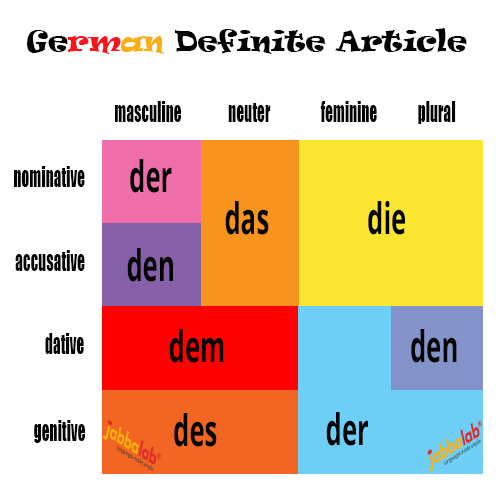
Most world languages have nouns that are either masculine or feminine. For masculine nouns der means the - der.

In a few languages the gender assignment of nouns is solely determined by their meaning or attributes like biological sex humanness or animacy.
Masculine and feminine in german. All nouns in German are either masculine feminine or neuter. When you learn that the word for dog is Hund learn that its a masculine noun - der Hund. For masculine nouns der means the - der.
Most world languages have nouns that are either masculine or feminine. German goes them one better and adds a third gender. The masculine definite article the is der the feminine is die and the neuter form is das.
German speakers have had many years to learn whether wagen car is der or die or das. In German most gender is unnatural. So instead of referring to a words meaning gender refers to the word itself.
To point out the gender of nouns you use different gender markers. The three gender markers that mean the singular in German are der masculine die feminine and das neuter. The plural form of the definite article is die.
A large number of feminine and masculine nounsdie Gebärde die Gebühr die Geburt die Geduld die Gefahr die Gemeinde die Geschichte die Geschwulst die Gestalt die Gewähr die Gewaltder Gebrauch der Gedanke der Gefallen favour der Gehalt content der Gehorsam der Genuss der Geruch. Unlike English every noun in German is assigned one of three genders. Masculine feminine or neuter.
Some of the genders are obvious such as the word for woman is feminine die Frau the word. Most nouns ending in -e are feminine. Many feminine nouns end in.
-heit -keit -schaft -ung -ei. Masculine German words referring to people can be made feminine by adding -in in the singular and -innen in the plural. Numbers used in counting are feminine.
The gender of German nouns can be identified by the article they take. Der for masculine die for feminine and das for neuter. While native German speakers intuitively know which article to use it is best for German learners to learn the article together with the noun.
As alluded to earlier German nouns are always one of three genders. Masculine feminine or neuter. A nouns gender has little or nothing to do with the meaning of the noun itself.
It is however one of the two elements that decide which definite or indefinite article goes before it. When you say my in German you use meine for feminine nouns - meine Mutter and mein for masculine nouns - mein Vater. Or meine Schwester my sister and mein Bruder my brother.
How to Tell If a German Word Is Masculine Feminine or Neuter. Learn About Germans Genitive Possessive Case. Comparing Gut Besser and Am Besten.
Learn the 4 German Noun Cases. 5 Ways the German Language Is Special. The German Word ihr Is an Article and a Pronoun.
-ur ending is feminine. Flat-ung ending is feminine. Seasons in German are masculine.
Small package-chen endings are neuter. The masculine and feminine figures of his paintings remain anonymous. Die männlichen und weiblichen Figuren seiner Malerei bleiben anonym.
It is also not an image representing the union of the masculine and feminine principles. Sie ist auch kein Bild für die Vereinigung des männlichen und weiblichen Prinzips. A noun is a word used for a person creature place or thing.
All German nouns have genders. Verbs and adjectives can become nouns too. Compound nouns are also a fun feature of the language.
-in when it expresses a female person die Freundin the feminine form of de Freund friend die Ärztin the feminine form of der Artzt doctor die Bäckerin the feminine form of der Bäcker baker etc but it is neuter for chemical terms for example das Benzin petrol gas das Protein protein. German is a gendered language meaning all nouns fall into either masculine category or feminine and neuter forms. Several nouns such as jobs have both masculine and feminine forms.
However as per reports the masculine form is used to describe the occupation in general terms. The Times even pointed out that the example of doctor. Common gender divisions include masculine and feminine.
Masculine feminine and neuter. Or animate and inanimate. In a few languages the gender assignment of nouns is solely determined by their meaning or attributes like biological sex humanness or animacy.
However in most languages this semantic division is only partially valid and many nouns may belong to a gender category. Masculine nouns are preceded by the definite article der or the indefinite articles ein. German masculine nouns can be identified by their suffix noun groups that they are formed out of adjectives or built out of strong verbs.